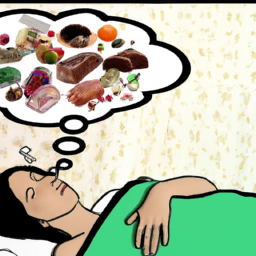As a person who is fascinated by the mysterious world of dreams, I am always amazed by the vivid colors, surreal landscapes, and strange creatures that populate our dream realm. But what if I told you that your diet could actually impact both the content and the vividness of your dreams?
Picture this: you’re lying in bed, your stomach full from a late-night snack, and you drift off to sleep. As you enter the realm of dreams, you find yourself in a strange, unfamiliar place. The colors are muted, the shapes distorted, and the people around you seem to be speaking in a language you can’t understand. Could it be possible that the pizza you had for dinner is responsible for this weird dream?
In this article, we’ll explore the connection between food and dreams, and see if there is any scientific evidence to support the idea that what you eat can affect your dreams.
Key Takeaways
- Spicy or fatty foods increase brain activity and lead to vivid dreams.
- Consuming sugary or carb-heavy foods before bed leads to disturbed sleep and more vivid dreams.
- Lack of vitamin B6 increases vivid dreams, while foods rich in it promote intense dreaming.
- Tryptophan in turkey and bananas leads to positive and pleasant dreams.
The Science of Dreaming
Do you ever wonder why you have such vivid dreams? Well, the science of dreaming suggests that it’s all about the activity in your brain while you sleep.
When we sleep, our brains are still active, and they go through different stages of sleep, including REM (rapid eye movement) sleep, which is when we dream the most. During REM sleep, our brains are processing memories and emotions from the day, and creating new connections between neurons.
While the exact function of dreaming is still not fully understood, it’s clear that it plays an important role in our emotional and cognitive development. And this brings us to the connection between food and dreams.
The Connection Between Food and Dreams
Indulging in that late-night snack may just be the reason behind those vivid, surreal experiences you have while sleeping. Research has shown that the food we consume can have a significant impact on our dreams. Here are a few ways in which the food we eat can affect our dreams:
- Certain foods, such as spicy or fatty foods, can increase brain activity and make it harder to fall into a deep sleep. When our brains are more active during sleep, it can lead to more vivid and memorable dreams.
- Lack of certain nutrients, such as vitamin B6, can lead to an increase in vivid dreams. Foods that are rich in vitamin B6, such as bananas and chickpeas, may promote more intense dreaming.
- Consuming sugary or carb-heavy foods before bed can cause a spike in blood sugar levels, leading to disturbed sleep and more frequent awakenings throughout the night. These disruptions can lead to more vivid dreams during the periods of lighter sleep.
- Some individuals may experience vivid dreams as a result of food intolerances. Consuming foods that trigger an immune response can lead to inflammation in the body, which can affect sleep quality and lead to more intense dreams.
As we can see, there are several ways in which the food we eat can impact our dreams. In the next section, we will explore some specific foods that have been known to affect dream content.
Foods That Can Affect Your Dreams
Certain foods can impact the content of your dreams. For example, consuming spicy or heavy meals before bedtime can lead to vivid and intense dreams. The reason behind this is that spicy foods can increase body temperature, which can disrupt sleep and lead to more vivid dreams.
Heavy meals, on the other hand, can cause indigestion and discomfort, which can also affect the quality of sleep and lead to more vivid dreams. Furthermore, consuming foods that contain tryptophan, like turkey or bananas, can also affect the content of your dreams.
Tryptophan is an amino acid that helps in the production of serotonin, which is a neurotransmitter that plays a role in regulating mood and sleep. Consuming tryptophan-rich foods before bedtime can increase the production of serotonin, which can lead to more positive and pleasant dreams. These foods can also help in promoting better sleep quality.
Understanding how certain foods can impact our dreams is important in maintaining good sleep hygiene and overall health. So, let’s now discuss how food affects sleep.
How Food Affects Sleep
Eating a heavy meal close to bedtime can lead to discomfort and disrupt sleep. For example, Jane had a hard time falling asleep and kept waking up feeling bloated and restless after indulging in a large pizza late at night. This is because the digestive process requires energy and can keep the body awake, leading to a restless night’s sleep.
Furthermore, eating foods high in fat or sugar can increase the risk of developing sleep apnea, a condition where breathing is interrupted during sleep, which can further affect the quality of sleep.
To improve sleep quality, it’s recommended to have a light and nutritious meal at least 2-3 hours before bedtime. Additionally, avoiding caffeine and alcohol before bed is also important as they can disrupt sleep patterns.
Lastly, establishing a regular sleep schedule and practicing relaxation techniques such as meditation or deep breathing can help promote better sleep and improve overall health. With these tips, it’s possible to achieve a more restful sleep and increase the likelihood of remembering dreams.
Tips for Improving Dream Recall
To maximize my ability to remember my dreams, I’ve found that establishing a consistent sleep schedule and practicing relaxation techniques before bed is key. This means going to bed and waking up at the same time every day, including on weekends.
It also means winding down before bed by doing things like taking a warm bath, reading a book, or practicing deep breathing exercises. By creating a calming and consistent routine, my mind is better able to relax and focus on my dreams.
Of course, there are other tips for improving dream recall as well, such as keeping a dream journal and paying attention to any recurring themes or symbols in my dreams.
However, it’s important to remember that the ability to remember dreams can also be influenced by cultural and belief systems. This will be explored further in the subsequent section.
The Role of Culture and Belief Systems
If you come from a different cultural background, your beliefs and traditions can greatly impact the way you perceive and remember your dreams, adding a unique layer to your dream experience and opening the door to a whole new world of interpretation. For instance, in some cultures, dreams are seen as messages from ancestors or as prophetic visions, while in others, dreams are considered to be mere random thoughts or even nightmares. These different beliefs can have a significant effect on the way a person approaches and interprets their dreams.
To illustrate this, let’s take a look at the following table that showcases some common beliefs and traditions from different cultures regarding dreams:
| Culture | Beliefs and Traditions about Dreams |
|---|---|
| Native American | Dreams are a form of communication with spirits and ancestors. |
| Chinese | Dreams are a reflection of one’s soul and can predict the future. |
| African | Dreams are a way to connect with the divine and receive guidance. |
| Western | Dreams are a manifestation of one’s subconscious thoughts and emotions. |
| Islamic | Dreams can be interpreted as signs from Allah and can offer guidance on decision-making. |
As you can see, each culture has its own unique perspective on dreams, which can influence the way a person perceives and interprets their dreams. Understanding the role of culture and belief systems in dreams can help us gain a deeper appreciation for the richness and diversity of human experience. Now, let’s move on to the next section and explore how sleep quality can affect our dream experiences.
The Importance of Sleep Quality
As I’ve mentioned before, cultural and belief systems can play a significant role in shaping our dreams. However, there is another crucial factor that affects our dream quality – sleep quality.
As someone who’s struggled with sleep issues for years, I’ve noticed a direct correlation between the quality of my sleep and the vividness and coherence of my dreams.
Studies have shown that getting enough high-quality sleep is essential for optimal brain function, and this includes dreaming. Without sufficient sleep, our brains may not have enough time to cycle through the various stages of sleep necessary for proper dream formation. On the other hand, when we get deep, restful sleep, our dreams become more vivid, memorable, and potentially even more meaningful.
As we delve deeper into the topic of dreams, it’s worth exploring the potential benefits of lucid dreaming.
The Potential Benefits of Lucid Dreaming
Imagine being able to control your dreams and explore new worlds while you sleep – this is just one of the potential benefits of lucid dreaming.
Lucid dreaming is when you become aware that you’re in a dream and can then manipulate the dream’s events and settings. Some of the potential benefits of lucid dreaming include:
- Being able to confront and overcome your fears in a safe and controlled environment.
- Exploring your creativity and imagination without limitations.
- Improving your problem-solving skills by practicing different scenarios in your dreams.
While the potential benefits of lucid dreaming are exciting, it’s important to note that current research on this topic has its limitations.
The Limitations of Current Research
Despite the potential benefits of lucid dreaming, current research on this topic has limitations and may not provide a comprehensive understanding of the phenomenon. One limitation is the difficulty in verifying whether a participant is truly lucid dreaming or simply imagining it.
Another limitation is the small sample sizes used in many studies, which can limit generalizability and statistical power. Additionally, there are ethical concerns with inducing lucid dreaming in research participants, as it may cause distress or interfere with their sleep quality.
These limitations highlight the need for more rigorous research on lucid dreaming, including larger sample sizes, more objective measures of lucidity, and consideration of ethical implications. Only with a better understanding of lucid dreaming can we fully explore its potential benefits and implications for sleep and mental health.
Frequently Asked Questions
Can eating certain foods before bed prevent nightmares?
Eating certain foods before bed can prevent nightmares. I’ve found that avoiding spicy or heavy meals and opting for foods high in tryptophan, like turkey and bananas, helps me sleep more soundly and have better dreams.
Is it possible for a lack of sleep to affect the way you dream?
My dreams are like paintings, vibrant and full of life. But when I don’t get enough sleep, they become distorted and fragmented. Lack of sleep affects the way we dream, making them less vivid and harder to remember.
Does drinking alcohol affect the types of dreams you have?
Drinking alcohol definitely affects the types of dreams I have. They tend to be more vivid and intense, but also more fragmented and surreal. Sometimes I can’t even remember them properly the next day.
Do different cultures have different beliefs about the significance of dreams?
It’s fascinating how different cultures perceive dreams. Some believe they predict the future, while others see them as a reflection of one’s innermost desires. Ironic, considering how much we still don’t understand about the science behind dreaming.
Can meditation before bed improve dream recall?
Meditating before bed can improve dream recall. I have found that taking a few minutes to clear my mind and focus on my breath helps me remember more details from my dreams in the morning.
Conclusion
Well, it seems like what we eat can definitely have an impact on our dreams. As I learned more about the science of dreaming, it became clear that there are many factors at play when it comes to the content of our dreams.
While some foods, like cheese and spicy dishes, are often cited as being linked to vivid or strange dreams, the truth is that there’s still much we don’t know about this connection.
One thing that’s clear, however, is that getting quality sleep is crucial for our overall health and wellbeing. Whether or not our diets play a role in our dreams, it’s important to prioritize good sleep hygiene and make sure we’re getting enough rest.
As the old saying goes, "you snooze, you lose"- and when it comes to our dreams, it seems that the quality of our sleep can really make all the difference.










